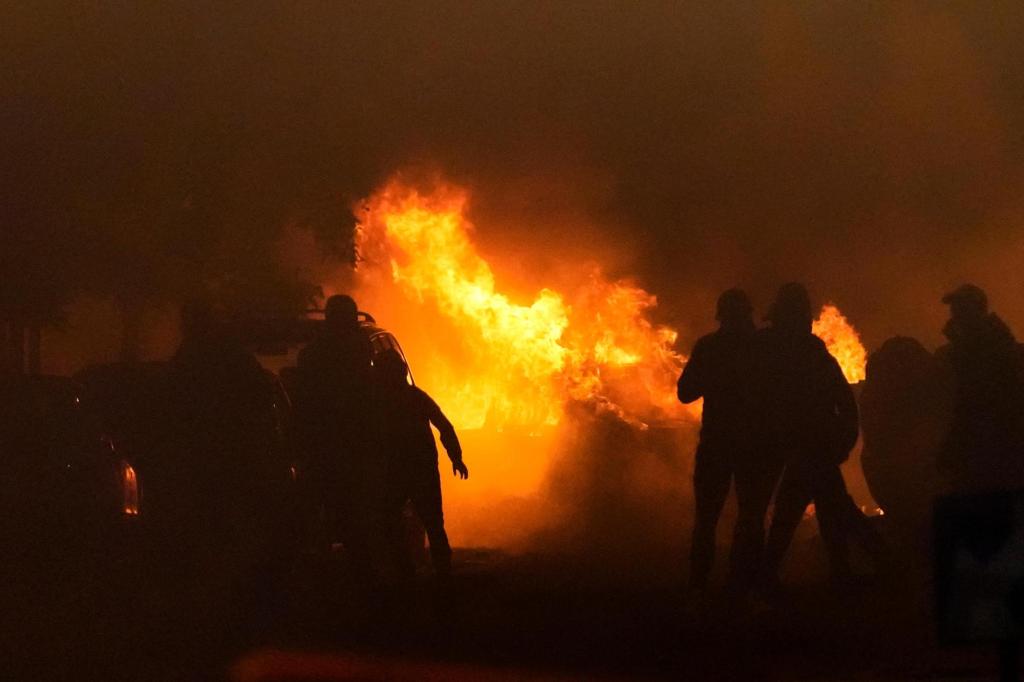
French police officer faces voluntary homicide charge after the deadly shooting of a 17-year-old – The Denver Post
Last Updated on June 29, 2023 by Admin
[ad_1]

By SYLVIE CORBET, JOHN LEICESTER and ALEX TURNBULL (Associated Press)
NANTERRE, France (AP) — A police officer in a Paris suburb was handed a preliminary charge of voluntary homicide Thursday after the deadly shooting of a 17-year-old that triggered two nights of riots, as the French government vowed to restore order and crack down on rioting that has spread to other cities.
The legal action came as police forces were quadrupled to quell the violence that has spread beyond the suburbs, bus and tram service was being curtailed, and one town announced a curfew through the weekend.
Nanterre prosecutor Pascal Prache said his initial investigation led him to conclude “the conditions for the legal use of the weapon were not met” in the shooting.
The teen, identified only by his first name, Nahel, was killed during a traffic stop in Nanterre on Tuesday. The shooting captured on video shocked the country and stirred up long-simmering tensions between police and young people in housing projects and other disadvantaged neighborhoods.
Under French law, preliminary charges mean investigating judges have strong reason to suspect wrongdoing, but allow time for further investigation before a decision is made on whether to send the case to trial. The police officer has been placed in provisional detention, according to the prosecutor’s office.
Ministers fanned out to areas scarred by the sudden flare-up of rioting, appealing for calm but also warning that the violence that injured scores of police and damaged nearly 100 public buildings wouldn’t be allowed to continue.
After a morning crisis meeting, Interior Minister Gerald Darmanin said police forces would be expanded from 9,000 officers to 40,000. In the Paris region alone, the number of officers deployed would more than double to 5,000.
“The professionals of disorder must go home,” Darmanin said. While there’s no need yet to declare a state of emergency — a measure taken to quell weeks of rioting in 2005 — he added: “The state’s response will be extremely firm.”
Bus and rail services were shutting down at 9 p.m. (1900 GMT; 3 p.m. EDT) to safeguard transportation workers and passengers, a decision sure to impact untold thousands of travelers in the French capital and its suburbs.
“Our transports are not targets for thugs and vandals!” Valerie Pecresse, head of the Paris region tweeted.
The town of Clamart, home to 54,000 people in the French capital’s southwest suburbs, said it was taking the extraordinary step of putting an overnight curfew in place from 9 p.m. until 6 a.m. through to Monday.
It cited “the risk of new public order disturbances” for the decision, after two nights of urban unrest. “Clamart is a safe and calm town, we are determined that it stay that way,” it said.
Despite a beefed-up police presence Wednesday night, violence resumed after dusk with protesters shooting fireworks and hurling stones at police in Nanterre, who fired repeated volleys of tear gas.
As demonstrations spread to other towns, police and firefighters struggled to contain protesters and extinguish numerous blazes. Schools, police stations, town halls and other public buildings were damaged from Toulouse in the south to Lille in the north, with most of the damage in the Paris suburbs, according to a spokesperson for the national police.
Fire damaged the town hall in the the Paris suburb of L’Ile-Saint-Denis, not far from the country’s national stadium and the headquarters of the Paris 2024 Olympics.
Darmanin said 170 officers had been injured in the unrest but none of the injuries was life-threatening. At least 90 public buildings were vandalized.
The number of civilians injured was not immediately released.
Prache, the Nanterre prosecutor, said officers tried to stop Nahel because he looked so young and was driving a Mercedes with Polish license plates in a bus lane.
He ran a red light to avoid being stopped but then got stuck in a traffic jam. Both officers involved said they drew their guns to prevent him from fleeing.
The officer who fired a single shot said he feared he and his colleague or someone else could be hit by the car, according to Prache. The officers said they felt “threatened” as the car drove off.
Two magistrates were named to lead the investigation, Prache said. Under the French legal system, which differs from the U.S. and British systems, magistrates often lead investigations.
Nahel’s surname has not been released by authorities or by his family. In earlier statements, lawyers for the family spelled the name Nael.
In a separate case, a police officer who fatally shot a 19-year-old Guinean man in western France has preliminarily been charged with voluntary homicide, the local prosecutor said Wednesday. The man was fatally shot by an officer as he allegedly tried to flee a traffic stop. The investigation is still ongoing.
Scenes of violence in France’s suburbs echo 2005, when the deaths of 15-year-old Bouna Traoré and 17-year-old Zyed Benna led to three weeks of nationwide riots, exposing anger and resentment in neglected, crime-ridden suburban housing projects.
The two boys were electrocuted after hiding from police in a power substation in the Paris suburb of Clichy-sous-Bois.
French President Emmanuel Macron held an emergency security meeting Thursday about the violence.
“These acts are totally unjustifiable,” Macron said at the beginning of the meeting, which aimed at securing hot spots and planning for the coming days “so full peace can return.”
Macron also said it was time for “remembrance and respect” as Nahel’s mother called for a silent march Thursday that drew a large crowd to the square where he was killed.
Some marchers had “Justice for Nahel” printed on the front of their T-shirts. “The police kill” read one marcher’s placard.
Bouquets of orange and yellow roses now mark the site of the shooting, on Nanterre’s Nelson Mandela Square.
French activists renewed calls to tackle what they see as systemic police abuse, particularly in neighborhoods like the one where Nahel lived, where many residents struggle with poverty and racial or class discrimination. Government officials condemned the killing and sought to distance themselves from the police officer’s actions.
Videos of the shooting shared online show two police officers leaning into the driver-side window of a yellow car before the vehicle pulls away as one officer fires into the window. The videos show the car later crashed into a post nearby.
The driver died at the scene, the prosecutor’s office said.
Deadly use of firearms is less common in France than in the United States, though several people have died or sustained injuries at the hands of French police in recent years, prompting demands for more accountability. France also saw protests against racial profiling and other injustice in the wake of George Floyd’s killing by police in Minnesota.
The most recent government statistics available show that 17 people were killed after police and gendarmerie officers shot at them in 2021.
Asked about police abuses, Macron said justice should be allowed to run its course.
A lawyer for Nahel’s family, Yassine Bouzrou, told The Associated Press they want the police officer prosecuted for murder instead of manslaughter.
French soccer star Kylian Mbappe, who grew up in the Paris suburb of Bondy, was among many shocked by what happened.
“I hurt for my France,” he tweeted.
___
Corbet reported from Paris. Oleg Cetinic and Christophe Ena in Nanterre, and Angela Charlton in Paris, contributed to this story.
[ad_2]
Source link




